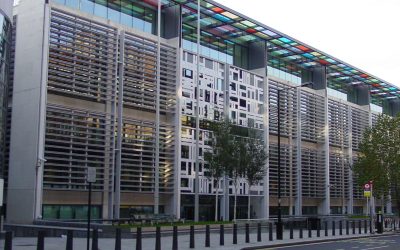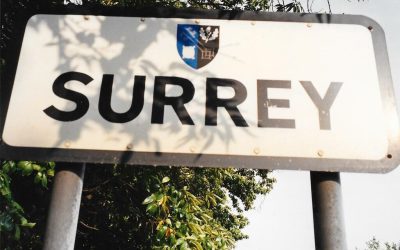In this email:
CLLR BRIDGET SMITH: Green growth is not a contradiction in terms
MUST-READS: Our round-up of the crucial articles for district councils
COLIN COPUS: Districts’ exclusion undermines the white paper’s social capital goal
NOTICEBOARD: Essential diary dates and opportunities for you and your council
DCN EXEC BOARD UPDATE: The issues discussed last week by our leading councillors
PLEASE SHARE THIS NEWSLETTER WIDELY ACROSS YOUR COUNCIL
 Green growth is not a contradiction in terms
Green growth is not a contradiction in terms
South Cambridgeshire seeks to use rapid growth to improve both living standards and biodiversity
Cllr Bridget Smith, vice chair, District Councils’ Network; leader, South Cambridgeshire District Council
The recent Census shows that Cambridgeshire is growing faster than any other part of the country. Overall, the county’s population has risen by 9.2% to 678,600 in the past decade, with the growth mostly focused on the travel-to-work area around Cambridge City and South Cambridgeshire.
Far from this growth posing a threat to our natural environment, we believe that it provides enormous opportunities to enhance it. We can use it to increase the amount of managed green spaces, improve public access to the countryside, reduce reliance on cars and improve housing stock so it’s suitable for low-carbon living with all the knock-on effects that has on cost of living. Cambridge might be lovely but it suffers from poor air quality, congestion, lamentable public transport and it is one of the most unequal places in the UK. The solutions to such problems are tied in with the improvement of the local environment.
Business is undoubtedly booming, especially in the knowledge-intensive sectors. This brings opportunities but also surging demand for housing. If we want to keep and attract the people our businesses need, it’s a necessity that we keep our already very expensive house prices and rents down and improve the public realm to meet the expectations of the 21st century employee and employer.
Firms tell us that they are struggling to recruit people from places such as Bristol. Although this is a lovely place to live, the ‘offer’ elsewhere is often seen as even better. The Cambridge and Peterborough Independent Economic Review a few years ago made it quite clear that for much of big business it was ‘Cambridge or abroad’. If Cambridge’s economy overheats it will not be the rest of the UK that benefits. The stakes are high as we seek to meet both our economic and environmental commitments.
Local Plan making is a massive challenge, especially as ours is joint with Cambridge City, but we have made the environment and climate change adaptation the overarching priority. We anticipate ours, which we expect to submit to the Planning Inspectorate toward the end of 2025 for independent review, will be an exemplar ‘Green Plan’. We have called for each development to bring with it a 20% biodiversity gain – twice that contemplated by the government. Green sites will be provided alongside areas being developed but we also acknowledge that with over 40,000 new homes planned by 2041 some off-site delivery of the biodiversity net gain is necessary. With fewer trees in South Cambs than anywhere else in the country, our Doubling Nature Strategy will still only bring us up to the national average.
Only 6% of new housing will be in villages – and these will be in villages with mainline stations – with the rest being on large scale strategic sites mainly on MOD brownfield sites including Bourne, Waterbeach and Northstowe, the latter being the largest new town since Milton Keynes.
The council works in partnership with others. However much we as a council can do to drive eco builds and environmental enhancement we are limited in what we can achieve by the necessity to ensure early delivery and certainty over strategic infrastructure. We are at the tipping point already regarding our water and energy supply. Only government can solve these problems.
Similarly, our aim to drastically reduce car ownership and use is limited by the need for proper green bus services and a rail network that is not only north/south focused. We are already working closely with council neighbours from Suffolk to Oxford to address these issues. We need the government to both trust us and to work with us to solve the really tricky problems that we cannot solve alone.
MUST-READS: Our round-up of the crucial articles for district councils
Sam Chapman-Allen, Chair, DCN, The MJ (£): Inflation’s impact is far reaching
James Hood, Director, DCN, LGC (£): Helping councils plan for economic turbulence
From DCN: DCN calls for action to ensure sustainability of support for Ukrainians
Tracy Bingham, Chief Finance Officer and Strategic Director, Oadby & Wigston Borough Council, The MJ (£): We need commitment over funding reform timetables
BBC Panorama: The making of a housing benefit millionaire
Lawrence Conway, chief executive, South Lakeland District Council, The MJ (£): Tackling the climate emergency in South Lakeland
Ben Beadle, chief executive, National Residential Landlords Association, Telegraph (£): The next PM needs to undo the damage unleashed on landlords
 Districts’ exclusion undermines the white paper’s social capital goal
Districts’ exclusion undermines the white paper’s social capital goal
Failure to give districts full combined authority membership exposes a contradiction in levelling up
Colin Copus: Emeritus Professor of Local Politics, De Montfort University; Visiting Professor, Ghent University
The removal of local and regional inequalities across the country is, for any government, a laudable but intricate and complex issue; and, like so many central approaches, especially those emerging at election time, levelling up was a slogan in search of a policy. Now we have the policy and a Bill to go with it. Yet there is an interesting distinction between the policy (the white paper) and the Bill as currently configured; it is a distinction that exposes a contradiction at the heart of the centre’s approach to devolution.
The white paper gave some prominence to social capital in understanding how individuals (and communities) can improve their lives and wellbeing locally by coming together to develop solutions to local problems through social networks, communication links and organisations they create. The white paper saw social capital as having a role in alleviating economic and social disparities, but as a concept it has all but disappeared from the Bill. Yes, the Bill addresses issues that help develop and strengthen social capital but social capital itself contributes to the aims of the Bill. Interesting then to see it apparently lost as something the Bill directly addresses.
Social capital relies on strengthening interrelationships between networks of people in particular areas and on the reciprocity and exchange of favours developed through close-knit social groups, their relationships and their shared sense of identity, values and trust and the way such groups work together. All of which all speaks to a localised (district-based) agenda.
Levelling up as it is currently configured operates with a series of national targets in the white paper and on the creation of one sort of combined authority or another and more territorial upheaval. Taken alongside the centre’s desire for larger units of local government, a cynic could be forgiven for thinking social capital doesn’t fit with the creation of larger units of local government as its development and strengthening relies on very localised action and therefore smaller units of operation. In other words, district councils, which are currently providing the services, resources and facilities and operating on a scale which supports, generates and energises the development of networks and links between individuals and communities.
The exclusion of district councils from full membership of new county-based combined authorities is a contradiction in levelling up, focused as it is on the centre’s obsession with larger units of local government. Apart from vociferously pointing out that contradiction, the district council voice needs to continue – through the sterling efforts of the DCN – to be heard at the centre to remind Westminster and Whitehall that it is not how big you are that matters; it’s what you do that counts. Reminding the centre that grand large-scale schemes can founder if not built on the needs of communities that operate on a much smaller localised scale is no bad thing. District councils are therefore vital to re-localising levelling up.
NOTICEBOARD: Events and opportunities to help you
DCN annual conference 2023
This prestigious annual event will be held on 23-24 February at Sopwell House within St Albans City & District Council’s area. Booking and programme details will be announced in due course.
DCN Building Safety webinar
Peter Baker, the Chief Inspector of Buildings, will be joining us at 1pm, Friday 9th September to discuss how the new Buildings Safety Act regulatory regime will work and what it means for DCN councils. Contact dcn@local.gov.uk for joining details.
Biodiversity net gain metric
This Defra consultation ends on Tuesday, 27 September. To participate, click here.
LGA sustainable procurement webinar
Tuesday, 13 September, 10am. Speakers include Vikki Robins of Oxford City Council. Full details here.
The Affordable Homes Programme since 2015
The Public Accounts Committee has issued a call for evidence, for which the deadline is Wednesday, 14 September. Full details here.
Help us reach more people on your council
The DCN is keen to reach out directly to more people on our member councils. We seek to build networks of s151 officers, communications lead officers and senior management team members leading on place or levelling up issues. This will help us share issues of potential concern or opportunity direct to these groups of staff. If the relevant officers on your council would like to hear from us, please give us their name, job title and email address and send it in an email with subject line ‘DCN new contacts’ to DCN@local.gov.uk and we’ll add them to our mailing list.
Help us make a case for districts
We want to make an even more powerful case for the value of districts through our lobbying and media work and are looking for case studies of the best of your work to help us pack a stronger punch. We’re particularly keen to get information on your work on supporting people through the cost-of-living crisis and on how you are working to level up. We’re also looking for districts with a powerful story to offer willing to host visits from journalists. Please send an email with subject line ‘DCN case studies’, stating in which area you wish to assist us, to DCN@local.gov.uk.
DCN EXEC BOARD UPDATE What the DCN member board discussed on 17 August
There was a focus on finance and inflation
- There was a presentation on the outlook for inflation and public spending from Ben Zaranko, Senior Research Economist at the Institute for Fiscal Studies
- Nico Heslop, Director of Local Government Finance at DLUHC, gave an update on local government finance
- Sharon Taylor, Lead Member for Finance at the DCN, and James Hood, Director at the DCN, discussed cost-of-living and budget pressures.
There was further discussion on how DCN should prepare for the new government, councils’ support for Ukrainians and nutrient neutrality.






